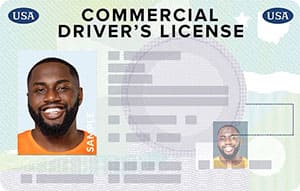- Updated for December 2024
- Based on 2024 TX commercial driver's license manual
Free Texas Special Requirements CDL Practice Test 2024
- Perfect for first-time and renewal CDL/CLP applicants, and those adding endorsements
- Triple-checked for accuracy
What you need to know

What to expect on the actual TX DMV exam
questions
correct answers to pass
passing score
Helpful links
List of questions (classic view)
- What is the color of the rear clearance lamps on any truck, bus, or trailer that is at least 80 inches wide?
- When lighted lamps are not required, _________ must be used instead of flares, lights, or reflectors.
- The vehicle's registration papers must include
- If the load you are hauling is __________ than allowed by law, you must obtain a special permit from the Texas Department of Transportation.
- If you're towing a house trailer at night outside the city limits or on a divided highway, your vehicle must be equipped with
- Vehicles transporting _________ must use triangular reflectors instead of flares.
- Your vehicle has broken down on a highway. What is the FIRST thing you must do?
- You have just stopped your CMV on the shoulder of a road. You must immediately activate your hazard warning lights if your CMV is at least ____ inches wide or at least ____ feet long.
- Every vehicle carrying passengers for hire or lease must carry a chemical type fire extinguisher with a capacity of at least
- Reflectors must be mounted at least ____ inches from the ground.
- No vehicle, including the load that it is hauling, may be more than ______ tall.
- When operated on a highway at night, such slow-moving vehicles as animal-drawn carts, farm tractors, and road machinery not otherwise required to have lamps must have
- Trailers, semitrailers, and pole trailers that weigh more than 4,500 pounds but no more than 15,000 pounds and are operated at speeds over 30 mph
- Combination vehicles weighing 3,000 pounds or less must be able to stop within ____ feet when traveling at 20 mph.
- Combination vehicles that weigh more than 3,000 pounds must be able to stop within ____ feet when traveling at 20 mph.
- A slow-moving vehicle emblem must be affixed to the rear of every vehicle designed to operate at ____ mph or less.
- You may not drive a CMV with ________ on a highway.
- What is the maximum weight for a single or combination vehicle including its load?
- On a steep downgrade, you should
- When following another vehicle, a CMV must leave
- Any trailer or semitrailer whose width is _________ must be equipped with clearance lamps, side marker lamps, and side reflectors.
- The rear of every bus or truck manufactured after model year 1959 must be equipped with
- Under Texas law, any vehicle that has _________ may not be operated on a public roadway.
- In Texas, all trucks must carry registration papers when being operated. One purpose of this requirement is to show
- The color of clearance lamps on the front of a vehicle must be
- Alabama: Test 1 / Test 2
- Alaska: Test 1 / Test 2
- Arizona: Test 1 / Test 2
- Arkansas: Test 1 / Test 2
- California: Test 1 / Test 2
- Colorado: Test 1 / Test 2
- Connecticut: Test 1 / Test 2
- Delaware: Test 1 / Test 2
- District of Columbia: Test 1 / Test 2
- Florida: Test 1 / Test 2
- Georgia: Test 1 / Test 2
- Hawaii: Test 1 / Test 2
- Idaho: Test 1 / Test 2
- Illinois: Test 1 / Test 2
- Indiana: Test 1 / Test 2
- Iowa: Test 1 / Test 2
- Kansas: Test 1 / Test 2
- Kentucky: Test 1 / Test 2
- Louisiana: Test 1 / Test 2
- Maine: Test 1 / Test 2
- Maryland: Test 1 / Test 2
- Massachusetts: Test 1 / Test 2
- Michigan: Test 1 / Test 2
- Minnesota: Test 1 / Test 2
- Mississippi: Test 1 / Test 2
- Missouri: Test 1 / Test 2
- Montana: Test 1 / Test 2
- Nebraska: Test 1 / Test 2
- Nevada: Test 1 / Test 2
- New Hampshire: Test 1 / Test 2
- New Jersey: Test 1 / Test 2
- New Mexico: Test 1 / Test 2
- New York: Test 1 / Test 2
- North Carolina: Test 1 / Test 2
- North Dakota: Test 1 / Test 2
- Ohio: Test 1 / Test 2
- Oklahoma: Test 1 / Test 2
- Oregon: Test 1 / Test 2
- Pennsylvania: Test 1 / Test 2
- Rhode Island: Test 1 / Test 2
- South Carolina: Test 1 / Test 2
- South Dakota: Test 1 / Test 2
- Tennessee: Test 1 / Test 2
- Texas: Test 1 / Test 2
- Utah: Test 1 / Test 2
- Vermont: Test 1 / Test 2
- Virginia: Test 1 / Test 2
- Washington: Test 1 / Test 2
- West Virginia: Test 1 / Test 2
- Wisconsin: Test 1 / Test 2
- Wyoming: Test 1 / Test 2
Your go-to, trusted source
Experience the Driving-Tests differenceOur commitment to accuracy and quality in our practice tests
Explore our rigorous, multi-tiered verification process that ensures each question mirrors the official manual for unparalleled accuracy.

At Driving-Tests.org, we understand the importance of reliable and accurate practice tests to help you prepare for your DMV exam. That's why we've developed a meticulous process to create and continually update our practice questions, ensuring they reflect the most current driving laws and regulations.
Here's an inside look at how we maintain the highest quality in our practice tests.
Content Creation and Verification Process
- Alignment with Official Manuals:
Every question we develop is based on the most recent version of each state's official driving manual. Our team regularly monitors each state DMV's website for the latest updates to ensure our practice tests are always aligned with the most current information. - Community Feedback Integration:
We leverage feedback from our vast community of users to understand which topics are most frequently tested. This helps us focus on the areas that are most relevant and beneficial for your preparation. - Expert Content Creation:
Our in-house editor, Steven, who has extensive experience in driver education, crafts each question with precision. He conducts a thorough review of each question against the official manuals to ensure accuracy. - Rigorous Review Process:
Once Steven has finalized a set of questions, our team conducts a joint review session. This second level of scrutiny involves content accuracy, proofreading, and fact-checking to eliminate any errors. - User Feedback Mechanism:
After a question goes live on our site, we keep the lines of communication open. Each question features a feedback button, inviting users to report any issues or errors. This continuous feedback loop allows us to address and rectify any concerns promptly. - Responsive Updates:
In line with our commitment to accuracy, we quickly update our practice questions to reflect any changes in the DMV manuals. Additionally, we update the free electronic copy of the state's driver's license manuals on our site, typically within a few days after the DMV publishes them.
Our thorough quality control process ensures that you have access to practice tests that are as accurate and up-to-date as possible. We believe in the power of well-prepared drivers and are dedicated to providing you with the best study tools to help you succeed on your DMV exam.
